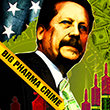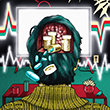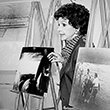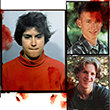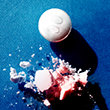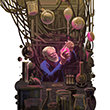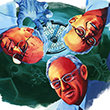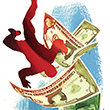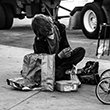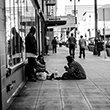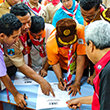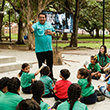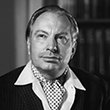
MEGHAN FIALKOFF sees the growing drug problem in New York City from the battlefield perspective of a drug-educator in the metropolitan area’s public schools.
Heroin and opiate use, said the Executive Director of Drug-Free World New York, has reached “epidemic proportions” that are affecting countless teens in the public school system.
It’s a perspective informed by nine years of attempts to fill an educational void for many young people facing the troubling plague of drugs.
According to Fialkoff, Drug-Free World’s approach to a seemingly insurmountable problem evolved gradually over the past nine years, one school, one student at a time.
“Basically, we started reaching out to schools,” she explained from her office in early March. “In Brooklyn, it caught on like wildfire.” So far, she added, the Drug-Free World New York has reached 2,200 schools with The Truth About Drugs, a prevention program developed and offered by its parent organization, Foundation for a Drug-Free World.
“That’s a milestone,” Fialkoff said, referring not just to the number of schools reached, but also to their receptiveness to the hard facts about drug abuse presented in The Truth About Drugs. “It’s not a sugar-coated program,” she explained. “It’s really hard-hitting, so it’s good.”
Drug abuse impact studies tell a staggering story. The National Institute on Drug Abuse estimates that the economic cost of alcohol and drug abuse is more than $417 billion annually.
Drug-Free World has worked with the New York Police Department, the Drug Enforcement Administration and many City Hall luminaries on drug-free programs.
Fialkoff’s outreach efforts have prompted praise in New York’s urban communities, particularly in many black, Latino and Asian neighborhoods. Tackling the drug problems there has become, she says, her mission in life.
To carry it out, she uses the materials of The Truth About Drugs program, which include a feature-length documentary, Public Service Announcements and informational booklets on the most commonly used drugs.
“The videos explain the stories through the people who have had problems with drugs,” Fialkoff said. “There are booklets with images and anecdotes about the facts about drugs,” she added. “Now the kids can make their own educated decisions when they’re posed with the question whether to do drugs or not.”
Fialkoff said Drug-Free World New York is carrying its successes outside U.S. borders, establishing a presence in North and South America.
“The original New York Chapter has expanded,” she said. “We had Carlos Manuel Perez, who was on a diplomatic mission from the Dominican Republic, come to learn about the Drug-Free World program.”
The Truth About Drugs activities in New York are financially supported by Scientologists and the New York Church of Scientology, where Drug-Free World New York recently held its first awards ceremony, honoring teachers, police officers and counselors.
Drug-Free World has won recognition from members of the City Council and the State Senate. Fialkoff has worked with several political figures in New York who support the program, including Assemblyman Felix Ortiz.
Drug-Free World has worked with the Drug Enforcement Administration and many City Hall luminaries on drug-free programs, Fialkoff said, adding that the organization’s chapters around the world take different approaches to drug issues. Fialkoff has also worked closely with the New York Police Department’s high-profile school liaison, Detective Patrick Blanc. “He’s all over the media, receiving awards from the mayor [Bill de Blasio] and [New York Police Department] Commissioner William Bratton,” she said. Fialkoff added that she met Blanc during a Drug-Free World event, where Miss New York 2015 Jamie Lynn Macchia, an anti-drug activist, was speaking. “He loved it. We booked an event in Harlem, and his group, the Office of School Safety, participated.”
Fialkoff is not alone in her message that drug abuse is best reversed through education and prevention programs like The Truth About Drugs.
New York State Sen. Terrence Murphy, co-chairman of the Joint Senate Task Force on Heroin and Opioid Addiction, also recognizes that small steps can make a big difference in drug reform, Fialkoff said.
“After a series of task force hearings, it has been made abundantly clear that this epidemic has no boundaries,” Murphy told the task force recently. Tackling the growing heroin and opioid crisis begins with properly funding prevention treatment and enforcement initiatives, the senator said. “No amount is too small when it comes to saving lives.”
Indeed, support for Drug-Free World is “coming from different places,” said Fialkoff, adding that the interest is motivated by concerns about drugs like OxyContin, which typically cause addicts to exhaust their “prescription pipeline” and turn to other drugs such as heroin.



